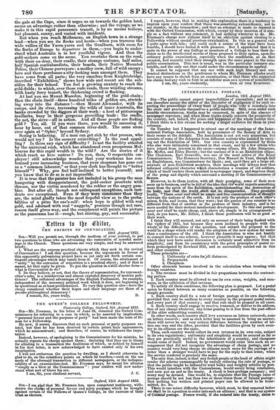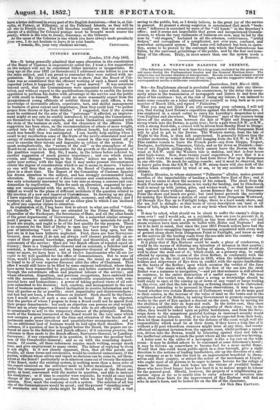INTERNATIONAL POSTAGE.
London, 12th August 1852. Sin—The public cannot expect impossibilities of journalists; and no one can therefore accuse the editor of the Spectator of negligence if he omit re- porting the proceedings of every knot of people who vote a somebody into the chair and proclaim themselves a public meeting. Still, even under such humble circumstances, truths may be enounced, in spite of the absence cf newspaper reporters; and when these truths nearly concern the prosperity of the country, and, indeed, the peace and happiness of the whole human race, I think there is a fair excuse for seeking a larger audience for them in your columns.
On Tuesday last I happened to attend one of the meetings of the Inter- national Postage Association, held by permission of the Society of Arts in their rooms at the Adelphi. The Association is not yet very numerous, but consists of some of the delegates from different nations who assisted in carry- ing out the Exhibition of 1851. Our own country is represented by those who also were intimately concerned in that event, and by a few others who havejoined from interest in the cause—among others, Sir John Burgoyne, Mr. Moffat, and Elihu Burritt ; but the nucleus of it is an Exhibition clique. The Chairman, Earl Granville, was one of the most active of the Royal Commissioners. The Honorary Secretary, Don Manuel de Ysasi, though half an Englishman, was Commissioner for Spain ; and, until they get a large ad- mixture of non-Exhibition members, their meetings will always bear that informal colloquial character which characterizes a reunion of old soldiers, which of itself renders them unsuited to newspaper report, and deprives them of the pomp and dignity which surround a meeting of the Commissioners of Sewers.
However, to do them justice, with all their gossiping, some of their men seem up to business, and to be full of the idea that the world expects something more from the spirit of the Exhibition, notwithstanding the destruction of its body, and that the world shall not be disappointed. They proclaim loudly, "There must and shall be ample and free communication of thought between the nations of the earth. It is not only the produce of each other's mines, fields, and looms, that they want ; but the genius of one country is as different from that of another as the produce of their industry, and is far more needed for their mutual intellectual development. To this end postage must and shall be made cheap, and, above all, simple in its arrangements." And, do you know, Mr. Editor, I think these gentlemen will be as good as their word.
I think they will succeed, not only on account of their being flushed with the victory of 1851, but because they seem inclined to grapple with the whold'of the difficulties of the question, and submit the proposal to the world'in a shape which will render the adoption of the new system far easier than a continuance of the old. I think the Association is wise not hastily to commit itself to one scheme, however plausible it may appear ; but that which they now have under discussion is certainly most attractive from its simplicity, and from its consistency with the great principles of postal re- form promulgated by Rowland Hill, and so successfully carried out in this and other countries.
These principles are- 1. Uniformity of rates for all distances. 2. Prepayment. 3. Cheapness.
Other elements become involved in the calculation when treating with foreign countries.
1. The revenue must be divided in fair proportions between the contract- ing parties.
2. Each country must be allowed to use its own coins, weights, and mea- sures, in the collection of that revenue.
To satisfy all these conditions, the following plan is proposed. Let a postal union be formed between as many countries as possible, on the following simple grounds. 1. Each country shall fix a rate of foreign postage at its own discretion, provided that rate be uniform to every country in the proposed postal union, and every part of that country ; and that rate shall be prepaid in all cases. 2. Each country shall engage to receive, transmit, or deliver to its address, free of any charge whatever, any letter passing to it free from the post-offices of the other subscribing countries.
In other words, each country shall levy a revenue on letters outwards, none on letters inwards; - and as each letter may be assumed to bring an answer, there will never be very serious difference between the number of let- Mrs one way and the other, provided that the facilities given by each coun- try to its citizens are the same.
Thus, each country would collect its own revenue in its own coin, subject to its own regulations ; uniformity and simplicity would be secured as far as they are practically useful to the inhabitants of a country, and cheapness would come of itself. Indeed, no government would enter into such an ar- rangement that did not recognize the advantage of cheap postage, and no country would very long charge its citizens much more for the carriage of a letter than a stranger would have to pay for the reply to that letter, when the service rendered is precisely the same. The only fear, indeed, is that any foolish people at the head of affairs might render the scheme unmanageable by unduly reducing the rate of postage, so that the public might be induced to send bulky and weighty articles by post. This would interfere with the Customhouse, would surely bring retaliation, and soon put an end to the treaty. A check is here perhaps necessary ; and many may be devised. One would be, to stipulate that the Foreign rates of postage should be not less than two or three times those of Inland postage ; that nothing but written and printed paper can be allowed to be trans- mitted, &c. &c.
There is one minor difficulty however, which must, be first removed before we shall be in a position to enter into such an alliance ; and that is our system of Colonial postage. France would, if she entered into the treaty, claim to have a letter delivered in every part of the English dominions,—that is, at Cal- cutta, at Putney, at Kilkenny, or at the Falkland Islands, as they will be all one in French eyes. You will therefore readily see that our monstrous charge of a shilling for Colonial postage must be brought much nearer the penny, which is the rate to Jersey, Guernsey, or the Orkneys.
As the cause of the Colonies is one which you have always made peculiarly your own, I do not hesitate to leave it in your hands. I remain, Sir, your very obedient servant, CinrrunioN.



























 Previous page
Previous page